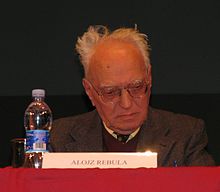Alojz Rebula
| Alojz Rebula | |
|---|---|

Alojz Rebula in 2007
|
|
| Born |
21 June 1924 San Pelagio, Italy |
| Occupation | Writer, Playwright, Essayist |
| Nationality | Italian |
| Notable works |
The Roman Empress' Vineyard, Nocturne for Primorska, Matins for Slovenia, Maranathà or the Year 999, The Snake Flower, Tomorrow across the Jordan, In the Wind of Sybil The Shadow Dance Jacques Maritain: The Bearer of Sense |
| Notable awards |
Prešeren Award 1995 for his literary work Acerbi Prize 1997 Nel vento della Sibilla Kresnik Award 2005 A Nocturne for Primorska |
| Spouse | Zora Tavčar (writer) |
| Children | Alenka Rebula Tuta (poet) |
Alojz Rebula (born 21 June 1924) is a Slovene writer, playwright, essayist, and translator, and a prominent member of the Slovene minority in Italy. He lives and works in Villa Opicina in the Province of Trieste, Italy. He is a member of the Slovenian Academy of Sciences and Arts.
Rebula was born in the ethnically Slovene village of San Pelagio (Slovene: Šempolaj) near Duino, in what was then the Kingdom of Italy. Because of the anti-Slavic Italianization policies of the Fascist regime, Rebula could not have an education in his native language. He attended Italian-language schools, where he became acquainted with Italian culture and literature. He went to the gymnasium of Gorizia and later the lyceum in Udine, which he graduated from in 1944. After the end of World War II, he moved to Yugoslavia. He studied classical philology at the University in Ljubljana, from where he graduated in 1949. In 1951, he moved back to Italy because of the pressures of the Communist regime. In 1956, he was banned from entering Yugoslavia because of his political opposition to the Communist system. In 1960 Rebula obtained his PhD from the University of Rome with the thesis Dante's Divine Comedy in Slovene Translations. The same year the authorities prohibited him from entering Yugoslavia for a second time, because he had publicly protested in Trieste newspapers against the suppression of the publication of the novel Listina (The Document) by Edvard Kocbek in Slovenia.
...
Wikipedia
